Georgia students will suffer from defunding AP African American history

I am extremely disappointed to learn that Georgia Superintendent of Schools Richard Woods has ordered the defunding of the Advanced Placement course in African American Studies. This decision will have a profoundly negative impact on today’s generation of Georgia students, depriving them of the benefits that I and countless other students at colleges and universities around the country have enjoyed over the past 50 years.
Today, I am a 76-year-old African American man living comfortably in retirement in Stone Mountain, after a career in law, business and financial services. Yet, I owe much of my success to my study of African American history, my undergraduate major at Yale University in 1971. Studying African American History and Arts and Culture alongside a traditional mix of courses in American history, sociology, political science and other disciplines shaped me in ways that I understood at the time and in ways I am still uncovering more than 50 years later.

These life experiences give me a special vantage point to assess the real-life impact of the superintendent’s actions. For Black students, I am concerned that they will miss the confidence, pride, hope and self-awareness that comes with knowing the history of one’s ancestry. White students will miss the benefits of becoming more informed about the history and culture of their fellow students and, by extension, the history of their country.
This history is not easy to digest. Black students must confront the courageous and the painful, white students the lofty and the disdainful. But it is America’s history. Facing this history honestly, decisively, builds mental acuity, character, resolve and empathy.
Grappling with tough issues is an essential part of the maturation process for all scholars. Georgia’s young scholars should not be deprived of this essential part of learning.
Most of all, I am concerned about the effect on students of all races who will be deprived of the opportunity to put aside the historical stereotypes, hostility and ignorance that has hindered generations of Americans from reaching across racial lines. Instead, they should be encouraged to sit with fellow students and acquire the knowledge and understanding that leads to empathy, respect for others and other life skills necessary to function in a multicultural society.
The latter, of course, is the real issue at hand: whether Georgia and other states will go willingly into the future as part of a multiracial nation or whether they will be dragged, kicking and screaming. The answer will depend upon whether, going forward, differences between the nation’s citizenry will be reduced or magnified, appreciated or stigmatized.
Over the past 60 years, significant progress has been made in this regard. School integration, coeducation, increased opportunities for minorities in employment and housing, plus the huge interaction of the races around American culture — sports, entertainment and the arts — have all helped to reduce differences between the races. Efforts to eliminate African American studies and learning tools such as critical race theory serve only to increase these differences.
I therefore urge Woods to reverse his decision and restore the funding for this vital program.
It was a Cobb County high school student who asked the “right” question — as scholars of all ages, races and fields are urged to do. He stated:
“We have over 20 AP classes in the state … like AP European History, AP World History, AP Japanese History,” he said. “Why is AP African American Studies not allotted by the state?”
He also offered a response:
“Take a look at who really wants classes like these to be offered,” he said. “It’s not political operatives. It’s not Democrats. It’s not lobbyists. It’s students.”
I agree. Georgia students should not be put at a disadvantage when competing for admission to the country’s top colleges and admissions. African American Studies courses should not be put at a disadvantage with other courses being considered by students seeking AP credits. Most of all, African American Studies courses and, by inference, African American culture should not be stigmatized as somehow not worthy of AP qualification.
I also call on Gov. Brian Kemp to end the back and forth and state unequivocally his support of AP credit and state funding of the African American studies course. Political interference has no place in education standards. Atlanta and Georgia enjoy an enviable reputation around the world as a bastion of education. Failure to correct this situation will do irreparable harm to the state’s standing with corporate recruiters and the international community.
I urge Georgians of all races who believe in the gift of education and the freedom of learning to write and call to the governor to order full AP credit and state funding without conditions for the African American Studies course. America has made serious progress in matters of race and equal education opportunity. The field of African American Studies also has grown tremendously, from a fledging program at a few colleges in 1969 to innumerable colleges and universities today at both the undergraduate and graduate school level as well as in public and private high schools. These successes should be celebrated in the state of Georgia, not suppressed.
Don M. Roman Sr. is a retired lawyer and financial services adviser.


